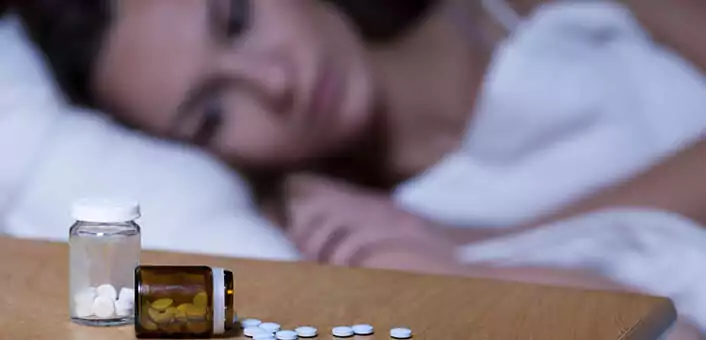
Sleep
Sleeping Pills: List of Side Effects and Alternatives
May 29, 2018Can’t catch a wink without that sleeping pills which has been prescribed? Does it lull you into the comfort of a perfect solution for your insomnia? Think again. Though sleep medications have genuine uses, they often do more harm than good. They may seem as a quick fix for sleep, but they cause serious health issues if used for prolonged periods. Sleeping pills or sleep medications have several downsides which we aren’t even aware of.
Heartburn
Is the sleep worth the heartburn you wake up with? It’s worse for people who suffer from GERD. If you suffer from heartburn, you may want to think twice before popping the sleeping pill. Studies conducted at the Thomas Jefferson University Hospital, found that people who took the popular sleep aid Zolpidem (Ambein) slept through their reflux instead of waking up for few seconds. They didn’t even realize they were going through heartburn symptoms! This, in long run, can damage the esophagus.
Dementia and Alzheimer’s
Elderly people who pop sleeping pills could be at a higher risk of developing Dementia or Alzheimer’s. According to the studies conducted among Canadian adults who used Benzodiazepine for prolonged periods, there was a likely increased risk of dementia by 51%. As per the guidelines by the NHS, the drug shouldn’t be used more the 8-12 weeks. Unfortunately, most of us ignore this time warning.
The director of the research, Dr. Eric Kiraan at Alzheimer’s Research UK, said – “This study shows an apparent link between the use of benzodiazepines and Alzheimer’s disease although it’s hard to know the underlying reason behind the link.” He also stated that “One limitation of this study is that benzodiazepines treat symptoms such as anxiety and sleep disturbance, which may also be early indicators of Alzheimer’s disease.”
Daytime Drowsiness
Do you wake up confused or groggy the next day because of the sleep meds you took last night? Sleeping pills are very powerful. They can induce sleep, but you don’t want the sleepiness after waking up. According to studies, people take the sleeping pills in the middle of the night which increases the chances of the day-time drowsiness. This is can mean that you aren’t awake fully which may also cause “sleep driving” as the effect of the sleeping pill hasn’t worn off.
Worsening Sleep Apnea
Sleeping Pills may worsen insomnia for those who suffer from sleep apnea. Obstructive sleep apnea blocks the airways either partially or fully as the oxygen levels in the body drops. Unfortunately, medication like Benzodiazepines and barbiturates are known to have this effect which only worsens the insomnia. Your sleep medicine ends up worsening the symptoms for which you took it in the first place!
Addiction and Dependence
Taking sleeping pills for prolonged periods develops a tolerance which may require higher dose intake to have the same effect. This increased dosage of medication may adversely affect your health due to the harsh side-effects of sleeping pills. The dependence on the sleeping pills progressively increases as you may not be able to sleep without popping the sleeping pill. Sleep medicines are highly addictive in nature where, if they aren’t taken, may cause withdrawal symptoms such as shaking, nausea, sweating, etc.
Safe and Natural Alternatives to Sleeping Pills
You can always opt for options which are natural and safe than popping sleeping pills or sleep medications. Here are some of the alternative methods to get a good snooze:
- Listening to soothing music
- Switching off all electronic devices like cell phones, iPad and computers, at least 2 hours before bed (their blue light interferes with sleep)
- Practicing mindfulness
- Aromatherapy
- Going to bed at the same time each night
- Sleep apps like Calm or Headspace – they have some wonderful bedtime stories for adults
Read our article to find more about natural sleep remedies.
Sweet dreams.
References:
Sleeping pills an Heartburn – http://www.health.com/health/condition-article/0,,20307960,00.html
Sleeping pills and Alzheimer’s – Benzodiazepine use and risk of Alzheimer’s disease: case-control study
Sleeping Pills and Daytime Drowsiness – http://www.sleepeducation.org/news/2013/08/07/when-to-take-a-sleeping-pill-for-insomnia
Sleeping Pills and Sleep Apnea – http://www.mysleepapneamd.com/blog/sleeping-pills-make-sleep-apnea-worse




